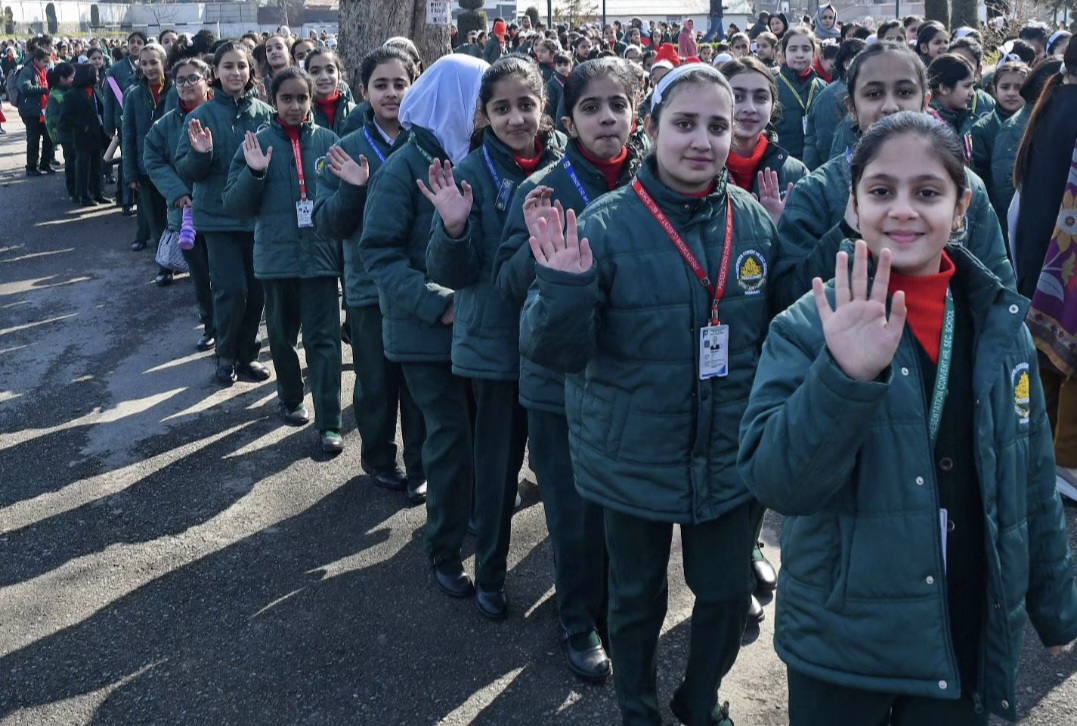Acknowledging Kashmir’s unique weather patterns, the government’s policy shift ensures exams are held before the severe winter sets in, making learning less stressful for students.
By Tauheed Ahmad
In a significant policy shift, the Jammu and Kashmir government, under the leadership of Chief Minister Omar Abdullah, has announced a significant change in the academic calendar for schools in the Kashmir Valley. The administration has decided to revert the academic session to November, replacing the March session introduced by the previous government. This decision, backed by Education Minister Sakeena Itoo, is aimed at addressing the long-standing concerns of students and parents while better aligning the school calendar with the unique geographical and climatic conditions of the region.
The policy change responds to persistent demands from the student community and their families, who argued that the March academic session caused undue disruption and added stress for learners. “This move comes as a relief to thousands of students and their parents,” said Chief Minister Omar Abdullah during the official announcement, acknowledging the widespread grievances linked to the March schedule.
Unlike many other regions in the country, the Kashmir Valley endures severe winters, which often render parts of the region inaccessible for months. These harsh weather conditions are a key factor influencing the new academic calendar. “Kashmir is not confined to plain areas. There are higher-altitude regions within the Valley and even parts of Jammu division, such as Doda, Kishtwar, Ramban, and Banihal, which face harsh winter conditions, often lasting until May,” explained an official from the Education Department. These conditions significantly disrupt school attendance, travel, and examination schedules, the official added.
Heavy snowfall during the winter months exacerbates the challenges faced by students, particularly in commuting to schools. Parents have long voiced their concerns, arguing that the March session forced children to attend classes during the coldest months, negatively impacting their well-being and academic performance. “It’s not just about commuting,” said Lubna, a parent from Srinagar. “The harsh weather impacts children’s ability to concentrate and perform well in exams.”
Educational experts have echoed these concerns, emphasizing that holding exams in November ensures students can complete their academic year before winter fully sets in. “This is a practical decision that aligns the academic calendar with local climatic conditions,” remarked a teacher who requested anonymity.
Under the revised policy, students up to Class 9 will now take their exams in November, just before the winter vacations. For students in Classes 10, 11, and 12, whose exams are overseen by the Jammu and Kashmir Board of School Education (JKBOSE), the November schedule will be implemented starting next year.
This decision has been widely welcomed by students and parents alike. Aisha Khan, a Class 10 student from Baramulla, shared her enthusiasm: “Studying for exams in March was always challenging because of the freezing temperatures and erratic power supply. This decision feels like a blessing.”
The shift to a November academic session also makes productive use of the extended winter vacation, allowing students ample time to prepare for the next academic year. “With exams in November, students can utilize the winter months to familiarize themselves with the syllabus for the new session. This is an advantage unique to the winter schedule,” noted Mudasir, a teacher at a Srinagar-based school.
Students have expressed their approval of the new calendar as well. “We used to lose precious time adjusting to new books and topics when exams were in March. Now, we can start early, which will ease the burden,” said Aisha Khan, a 9th-grade student from Budgam.
The return to a November session represents a significant adjustment in the educational framework of Jammu and Kashmir. By prioritizing the welfare of students and adapting to the region’s climatic realities, the government has taken a step that resonates deeply with the aspirations of its people.
For NEET aspirants in Jammu and Kashmir, the decision to revert the academic session to November is being celebrated as a major relief. Irtiqa Tariq, a student from Srinagar preparing for the highly competitive NEET examination, expressed her thoughts on the matter. “This is obviously a blessing. During the March session, our exams often extended into mid-April, leaving us with hardly any time to focus on NEET preparation. With just a few days gap in May, many students were forced to take an extra year to prepare properly.”
She further highlighted a critical concern about curriculum disparities. “Students from CBSE-affiliated schools perform better because of the curriculum’s advanced standard, which JKBOSE lacks. I hope the government will address this gap and align the curriculum with CBSE patterns so we too can compete on equal footing,” she said, urging for reforms to better equip local students for national-level examinations.
The original March session was introduced to synchronize Kashmir’s academic calendar with the national framework. However, this shift faced significant criticism for disregarding the region’s unique geographical and climatic realities. “Forcing a uniform calendar across a diverse state like J&K isn’t practical. The November session aligns better with the needs of Kashmir and even parts of the Jammu division,” said Ajaz Masood, President of the North Kashmir Private School Association. He pointed out that the challenges faced by students in the winter zones of Jammu, including Bhaderwah and Kishtwar, are similar to those in Kashmir. “Harsh winters and geographic isolation often delay the start of the academic year, creating further disparities between students in these regions and those in the plains of Jammu,” he added.
The decision has sparked reactions across the educational spectrum. The Private Schools Association of Jammu and Kashmir (PSAJK) has strongly supported the move. Calling it a “step in the right direction,” PSAJK President G.N. Var stated, “This decision considers the welfare of students and ensures a more conducive learning environment.”
Education Minister Sakeena Itoo, who spearheaded the proposal, emphasized its student-centric focus. “We are announcing a change of academic session back to November-December from this year for non-board classes, i.e., up to Class 9, for Kashmir Province and winter zones of the Jammu Province. For higher classes, the session would be restored from next year,” she announced. Explaining the rationale, she added, “The November session is not just about exams. It’s about making education accessible and stress-free for students.”
Chief Minister Omar Abdullah also addressed the significance of the change in a video message, acknowledging the demands of parents and students. “There was a demand from parents and students for reverting the academic calendar to the November session instead of the March session in Kashmir and the winter zones of the Jammu division. I am thankful to School Education Minister Sakina Itoo for bringing this proposal to the cabinet, which has approved it.” He clarified that while classes 1 to 9 will follow the November schedule from this year, classes 10 to 12 will make the transition starting next year.
The March session had initially been implemented in 2022 by the LG administration to synchronize the academic calendar of the Valley and the winter zones with the rest of the country. However, persistent demands from parents and students led the Abdullah government to reverse the decision. As a result, annual examinations will now be held every November, ensuring a smoother academic transition for students.
This policy reversal has reignited a debate about balancing regional needs with the national academic framework. While critics highlight potential logistical concerns, many argue that the benefits of the November session outweigh the challenges. For one, conducting exams before the harsh winter ensures students in remote and snow-bound areas can participate without concerns over blocked roads and extreme weather conditions. Additionally, the extended winter vacation offers students ample time to prepare for the new academic year, easing their transition to higher grades.
Chief Minister Omar Abdullah reassured students and parents that examinations for higher classes—10th, 11th, and 12th—would also adopt the November schedule by next year. “We couldn’t shift the Board exams this year due to logistical challenges, but we are committed to implementing this change across all grades by 2025,” he said in his video message.
As the education system adapts to these changes, stakeholders hope the policy will bring long-term benefits to students across Jammu and Kashmir, ensuring their academic pursuits align with the region’s unique needs while enabling them to compete effectively at the national level.


Leave a Reply